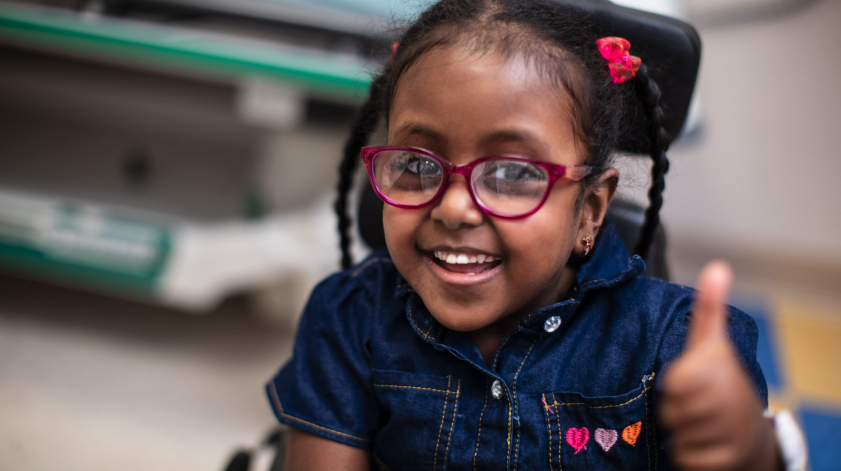
Inherited Metabolic Disorders Program

The Inherited Metabolic Disorders Program at Children's National Hospital provides a wide range of clinical services and specialties for children and families. Our program is one of the largest in the country with more than 600 active patients.
Our team has the clinical expertise to diagnose and treat infants, children and adults with rare metabolic disorders, and offer an extensive support network for patients and their families. We also offer a specialized, family-centered approach to care, featuring metabolic dietitians for children who must follow a special metabolic diet.
Get to Know Our Rare Disease Institute
Children's National Rare Disease Institute (RDI), home to the Inherited Metabolic Disorders Program, is a first-of-its-kind center focused exclusively on advancing the care and treatment of children and adults with rare genetic diseases. We were the first designated Center of Excellence by the National Organization for Rare Disorders, recognizing excellence in clinical care and patient support services.
Contact Information
To make an appointment with a member of the Inherited Metabolic Disorders team, call us at 202-545-2531.
In an emergency, please contact the geneticist on-call by calling the page operator at 202-476-5000 and ask for the geneticist on-call.
Experts in Diagnosing and Treating Rare Disorders
Inherited metabolic disorders are rare among the general population and may often be misdiagnosed, as symptoms often mirror those associated with other conditions. Our program provides diagnostic testing, evaluation and management for patients with inborn errors of metabolism. In addition to diagnostic testing, we provide treatment for patients identified by newborn screening.
Among the more than 75 conditions we care for, we have particular expertise in:
- Galactosemia
- Leukodystrophies
- Lysosomal storage disorders
- Mitochondrial disorders
- PKU (phenylketonuria)
- Organic acidemias
- Urea cycle disorders
Newborn Screening Follow-Up Program
Newborn screening (NBS) is widely recognized as an essential, life-saving public health program. The screening consists of a simple heel stick for a few drops of blood when a baby is between 24 and 48 hours old. The blood is sent to a state-approved laboratory for testing. All states and the District of Columbia have established NBS programs to identify treatable disorders before they cause serious health problems. Most of the conditions are not easily recognized at birth and are not associated with a family history of disease. If left untreated, some disorders can cause intellectual disability and/or lead to death. Early treatment improves outcomes dramatically.
The Children's National Rare Disease Institute’s NBS Follow-Up Program specializes in the evaluation and diagnosis of children who have had an abnormal metabolic newborn screen. While some abnormal screens do not reflect true disease (known as “false positives”), immediate clinical assessment is recommended and available in our program, typically within one business day. At an NBS Follow-Up Program clinic visit, a nurse practitioner or geneticist will take a complete medical and family history, perform a physical exam, order necessary diagnostic laboratory testing and start any necessary or preventative treatment.
Conditions We Treat
Inherited metabolic disorders are rare among the general population and may be misdiagnosed, as symptoms often mirror those associated with other conditions. The Inherited Metabolic Disorders Program provides diagnostic testing, evaluation and management for children with the following inborn errors of metabolism.
- Abetalipoproteinemia
- Acrodermatitis enteropathica
- Alpha mannosidosis
- Arginase deficiency
- Argininosuccinate lyase deficiency (ASA or ASL)
Metabolic Transplant Program
The Inherited Metabolic Disorders Program of the Children’s National Rare Disease Institute has partnered with the MedStar Georgetown Transplant Institute to establish a Metabolic Transplant Program. There are currently no cures for inherited metabolic disorders, and many of these conditions are associated with frequent hospitalizations and long-term intellectual disability.
Liver transplantation may effectively treat some of these conditions, stabilizing intellectual outcomes and preventing other disease manifestations. In recent years, the Metabolic Transplant Program has resulted in the successful transplant of over 20 children with otherwise incurable metabolic disorders. Additionally, research utilizing the livers taken from these children has advanced our understanding of these rare conditions and helped identify new therapeutics.
Locations

Main Hospital
- Specialty Care
- Emergency Care
Biochemical Genetics Lab
The Inherited Metabolic Disorders Program partners closely with our onsite Biochemical Genetics Laboratory to offer a wide variety of laboratory tests without needing to send to outside labs. This includes routine blood spot analysis for PKU and MSUD. The onsite lab allows for faster turnaround of laboratory and genetic testing for our patients.

Give to Save Lifetimes
Change a child's life forever. Donate to help find cures, fuel innovation and provide world-class care for every child.







